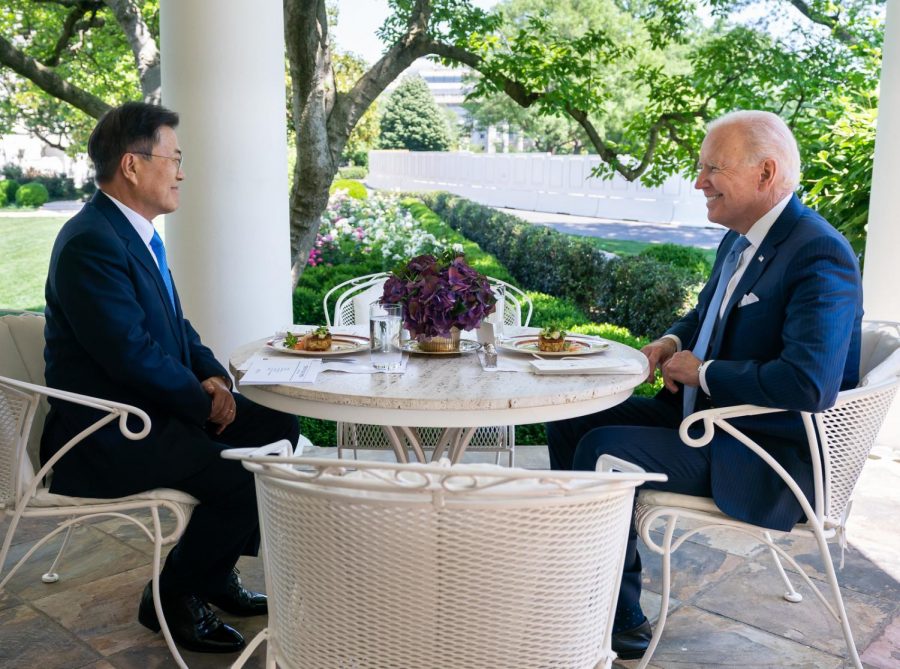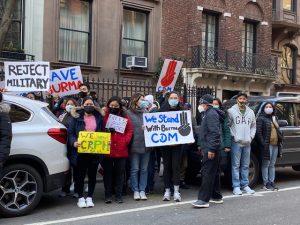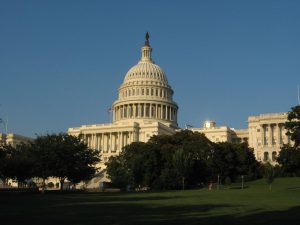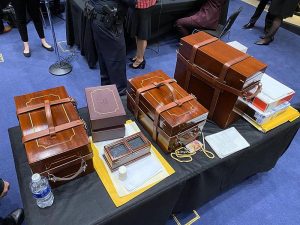The Myth of a Crumbling United States: From the Perspective of a ‘Puppet State’ Citizen
The United States, as imperfect as it is, appears as a beacon of democracy, progress and opportunity to millions across the globe
WHITE HOUSE VIA FLICKR
Moon Jae-in, president of South Korea, meets with Joe Biden, president of the U.S. The two nations have been friends since the mid-20th century.
October 6, 2021
The last American troops were evacuated from Afghanistan weeks ago; America’s grip over the Middle Eastern nation is now over. Many see the desertion of Afghanistan as a signal of America’s declining influence over the contemporary world. To a certain extent, that notion holds true. The modern United States may no longer be able to police the affairs of the world at the capacity it did decades before. And yet, the American network of alliances remains stronger than ever, particularly after the presidential inauguration of the globalist Joseph Biden.
The U.S. military remains unparalleled in manpower, advanced technology and possession of weapons of mass destruction. The United States finds itself as impregnable and mighty as the former Roman Empire; the most powerful military, the most compelling diplomats, unrivaled soft power, that is to say, influence through language, culture, and ideology, as well as the largest network of dependent allies places the United States on a unique pedestal in world history. The Romans controlled the Mediterranean. The Mongols controlled Eurasia. The British controlled the seas. Americans control the world.
No polity throughout world history wielded as much power, both soft and hard, as the modern United States. With such unprecedented power, the United States, a hermit of diplomacy slightly more than a century ago, crafted the largest network of modern alliances reinforced by the necessity of dependence, resources, military presence and cultural ties.
NATO stands as the pinnacle of democratic defense against rising authoritarian states, most notably China. Bulwarks of democracy and capitalism such as Israel in the Middle East and Japan in East Asia see cooperation as their only route to survival against increasingly threatening extremist groups, civil war, and foreign pressure. Democracy and liberty around the world ultimately lie in the hands of the United States.
I, alongside millions, was fortunate enough to be born under the veil of American democracy. The Republic of Korea, also known as South Korea, is a pillar of liberty in a region plagued by authoritarianism to the north and the west. North Korea, Russia and China exert increasingly mounting pressures against the independently feeble nation of South Korea.
Camp Humphreys in Pyeongtaek, Camp Carroll in Daegu, Camp Stanley in Uijeongbu and Camp Hovey in Seoul shield my nation of 50 million against the threats of neighbors with authoritarian regimes. It is the American military presence in my country on which we rely to maintain peace and to secure our borders, our way of life, and our values as a nation of democracy built upon the bedrock of a free market made possible by American intervention in the Korean War. It is not as “puppets” or “satellite citizens” (vassals, to use crude terms) that the majority of Koreans view themselves as, but rather, as friends — friends of both the U.S. and of liberty.
The United States of America remains a beacon of hope, prosperity, fortune and democracy to the free world.
The United States is not moribund. What poses the greatest risk to America is not physical. Fear of ascendant enemies, insecurity about the future of our ideals, disunity — such concepts erode the foundations of our great union, not only of our 50 states but beyond, including our allies in France, Japan, Israel and Australia. It is not only military prowess to which we can credit America’s success as a nation, but it is the American ideal of progress, of life and liberty for all.
The United States of America remains a beacon of hope, prosperity, fortune and democracy to the free world. It is English the free world strives to learn; it is democracy the free world hopes to govern through; it is glory in which the free world hopes to share with America as it powers through turbulent times. We lend a hand to secure the great veil of life, liberty and the pursuit of happiness that the United States played the role of architect in. The darkest hour may yet come for Pax Americana, but I, a citizen of a friend of the United States, believe that victory over the vices of our enemies, both present and future, will be ours.













